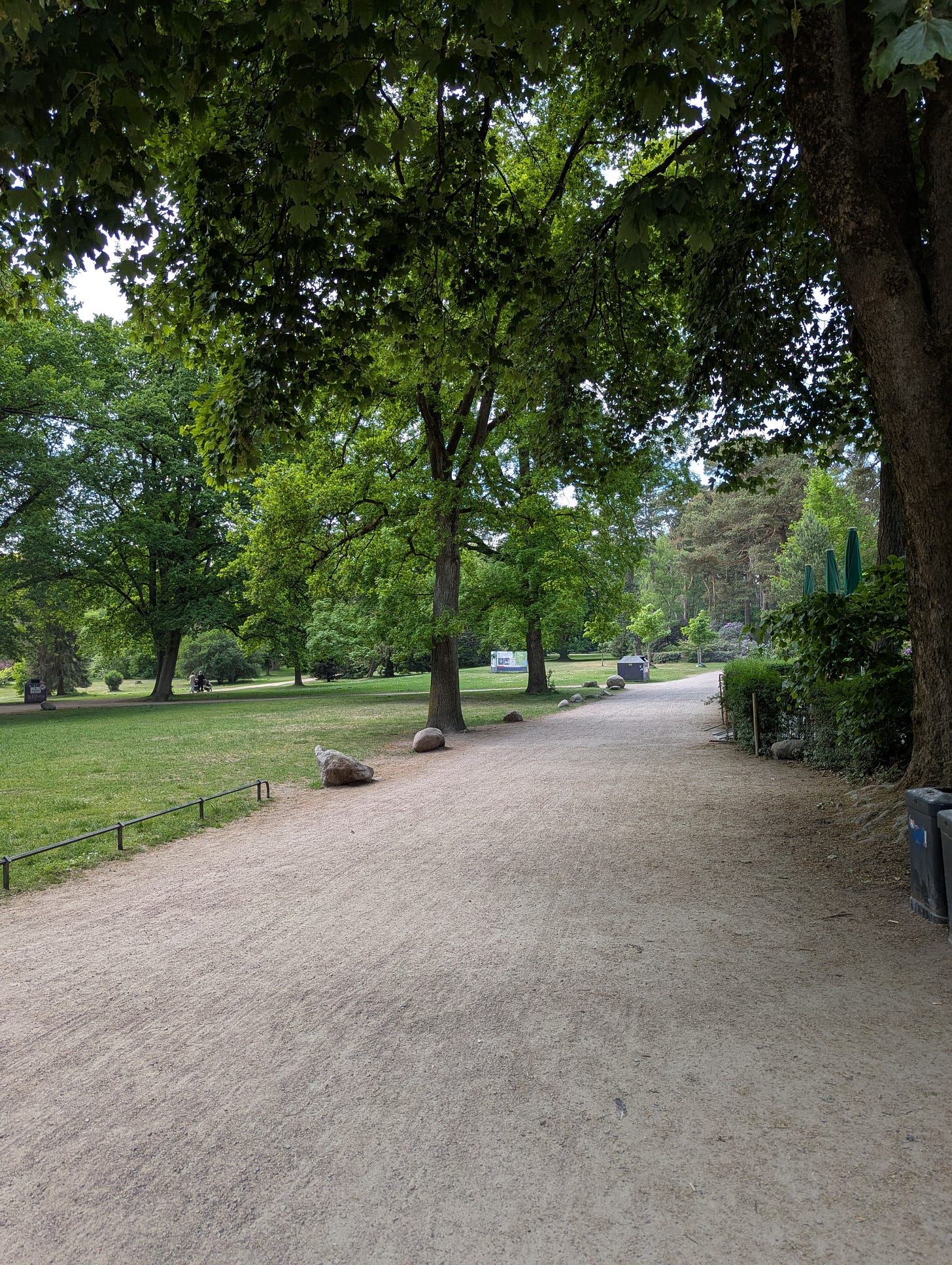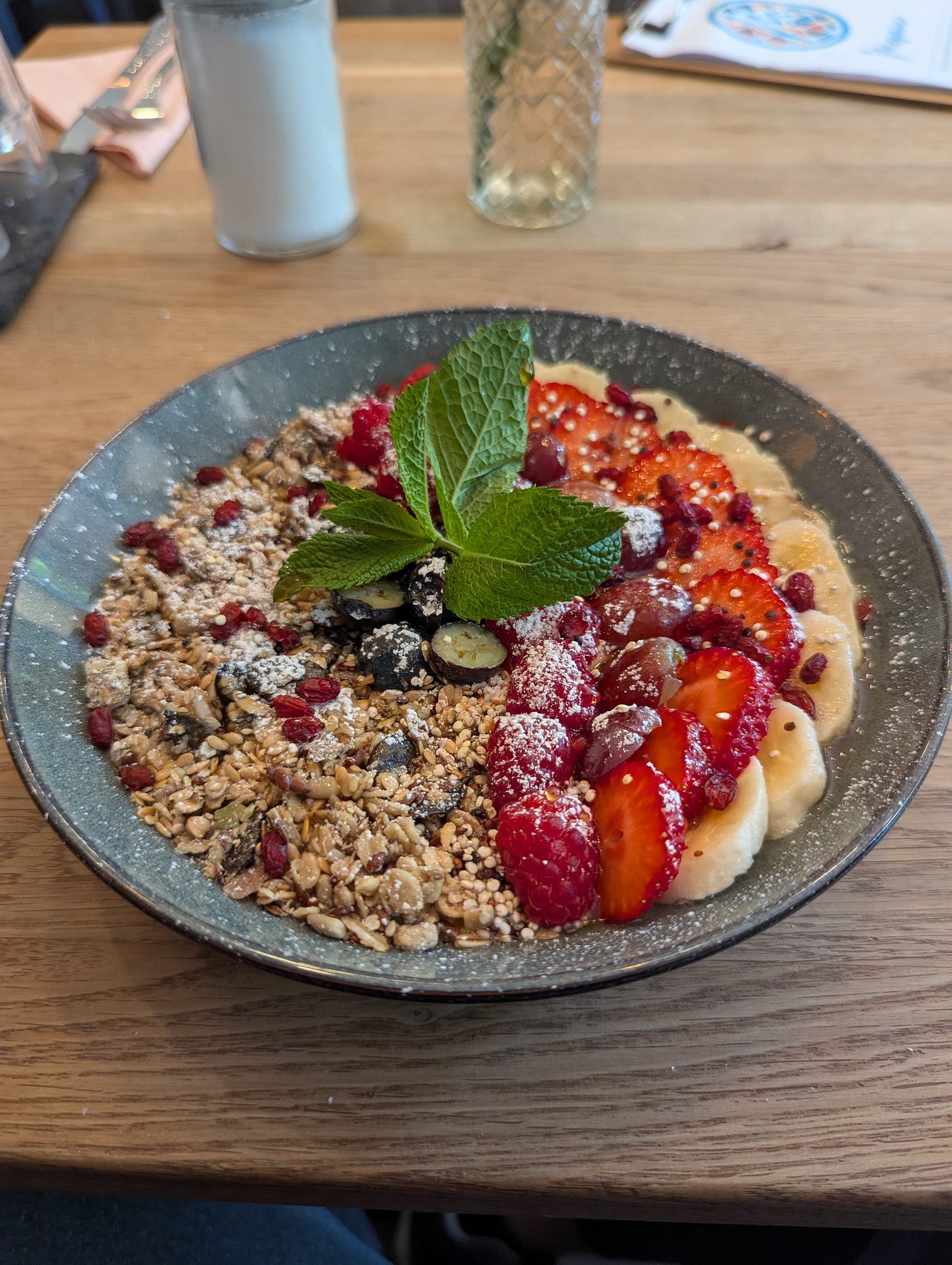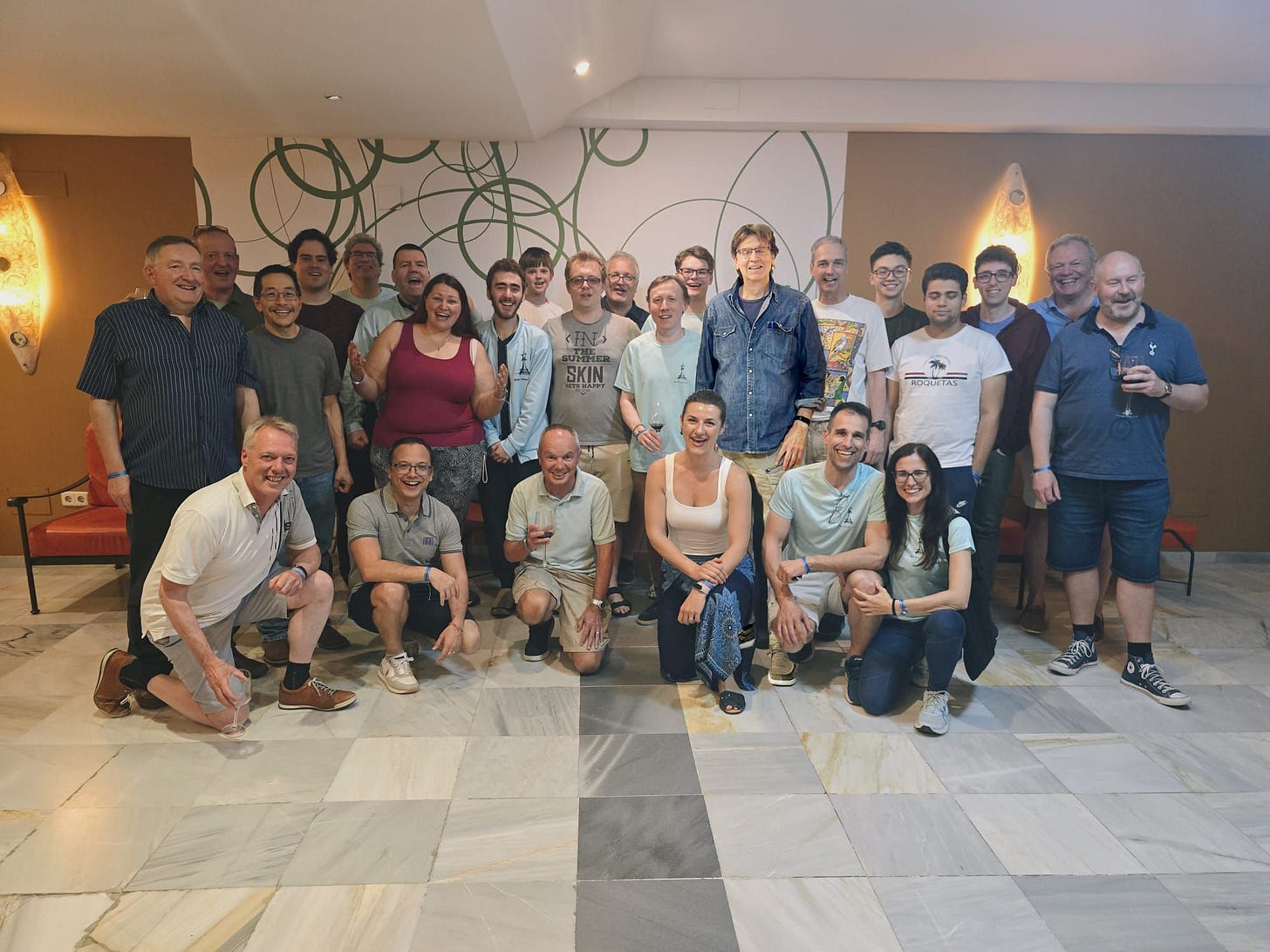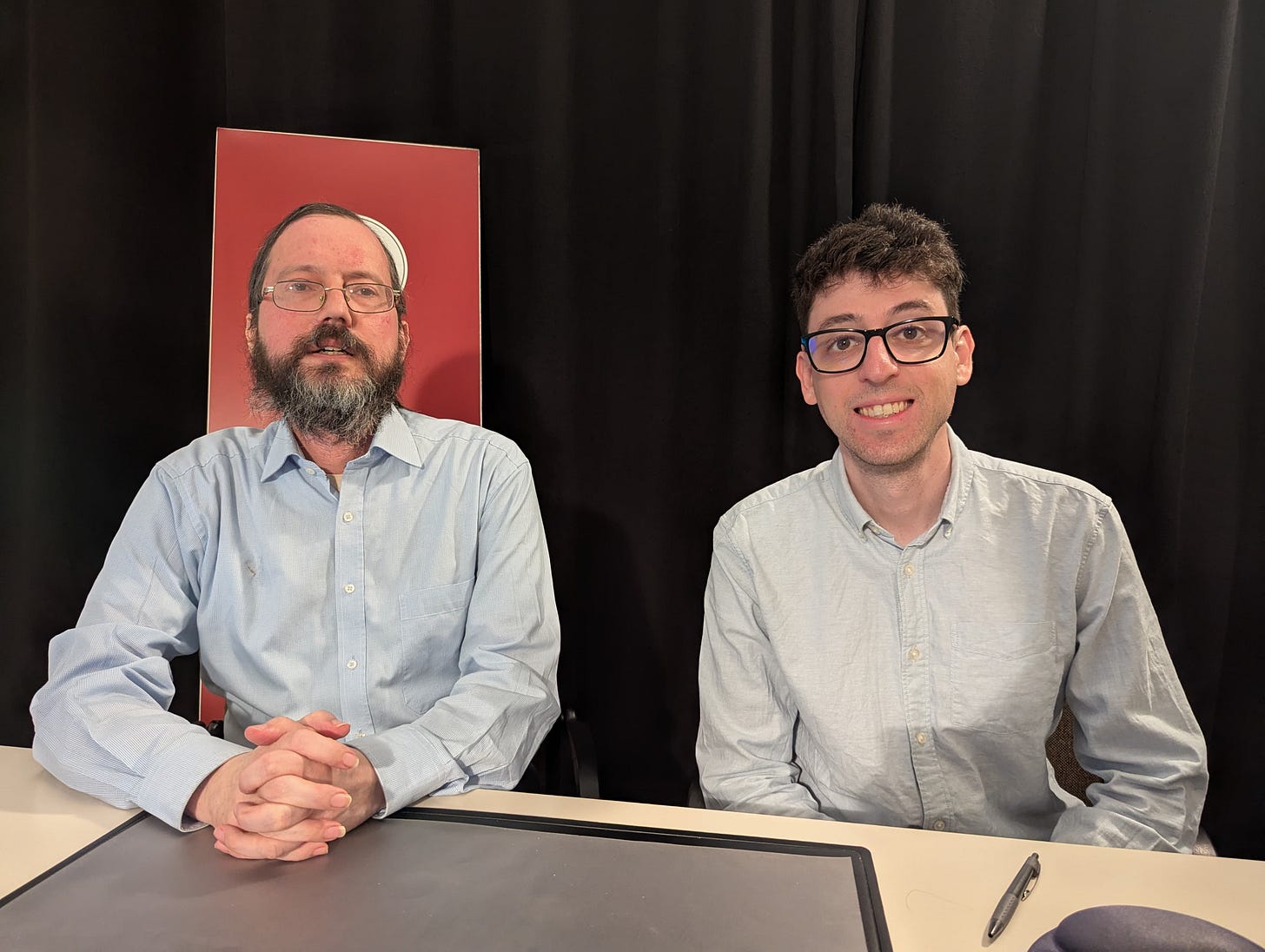After the Reykjavik Open, I traveled to Karlsruhe, Germany, for an even bigger tournament: Grenke. It was a few hours before the start of the event that I sat in a coffeeshop and wrote my previous post about meeting Ivanchuk. I clicked publish, let the internet do its thing, then grabbed a bite and waltzed to the playing hall to await the pairings. The initial response to the piece was quite positive, and I started to get the sense that I had done something. A short while later, I was lost in the first round after just 15 moves. I won the game, but already got the feeling that something was off.
Long story short, Grenke did not go well for me. I ended up gaining two rating points (which is still a victory, of course), but my play was poor throughout. I was missing stuff, getting outplayed, and struggled with converting. Rather predictably, I started feeling a ton of pressure after writing that stupid Reykjavik article, like now I had something to prove in all of my games. Whereas the whole point of the story was to admit that I actually had no real grounds to expect progress, considering my lack of hardcore chess training. But now I was just in my head the whole tournament, playing badly, and not enjoying the chess. Well, lessons were learned, especially after I got the chance to review the games with GM Jacob Aagaard, who had some choice words for yours truly (more on that later).
In the end I finished with 6.5/9 (+6, -2, =1), facing just a single GM. I was only really happy with one game that I played, which featured a thematic exchange sacrifice:

Overall, the event itself was quite impressive—over 3000 players! The best part was that I could watch the coinciding Freestyle Open, which was absolutely star-studded, not just with Magnus & the current crop of elites, but with plenty of top players from the recent past—guys like Grischuk, Kamsky, Bacrot and others who you rarely see all in one place. And every round I was so jealous of the Freestyle players—with two games per day, I was spending all my rest time prepping while they could just chill between the rounds. Imagine.
Chessbase
After Grenke, I took a train up to Hamburg to visit the headquarters of another fixture of the chess world, Chessbase. I spent ten days there, recording a course on calculation to be released later this year. Naturally, I had to overcome some serious imposter syndrome, as it’s a bit weird lecturing on chess after you just spent a whole tournament feeling like an amateur. File it under “content creator struggles”.
The visit to Chessbase HQ was very enjoyable — their office is filled with friendly people and historic memorabilia, with countless legendary players having visited their studio. Ultimately I was happy with how the course turned out, and I even made plans to record a second course later in May.
I was also quite impressed with Hamburg, a very eco-friendly city with tons of greenery, cute parks, excellent walkability (welcome to Europe!), and delicious bakeries on nearly every corner. Also döner, lots and lots and lots of döner 😋.
Killer Chess Training
Next was what I thought would be the highlight of my Eurotrip: getting to learn from GM Jacob Aagaard at the Killer Chess Training camp, held in Roquetas de Mar, Spain. Jacob is undoubtedly one of the top chess coaches in the world, having worked with many grandmasters, perhaps most notably being Boris Gelfand (during his 2012 World Championship run), Sam Shankland (on his way to winning a stacked U.S. Championship), and Nodirbek Abdusattorov (taking the kid from 26xx to 2750).
To say I’m a fan of Aagaard as an author would be selling it short. When I started taking chess seriously at the age of 15—the catalyst may be surprising, it was Fischer’s death in 2008 which prompted me to learn about his story and become enthralled with chess history and culture—I began reading as many chess books as I could. One of those books was Aagaard’s Excelling at Chess, a general guide for chess improvement that was part of a series under the same title. It was an instant game-changer for me. I learned about psychological mistakes I didn’t even realize I was making (I would have been roughly 2000 at the time) and what it truly meant to play chess at a higher level. I was also quite fond of Excelling at Chess Calculation, which explained a lot of techniques I still use to this day (although, Jacob if you’re reading this, it was way too hard for people like me who hadn’t learned how to calculate!). I definitely had to work hard to go through the book, but the writing was extremely compelling.
Inspired by Aagaard, I then began reading the books of Mark Dvoretsky, perhaps the most seminal being Attack & Defense, which greatly furthered my chess development. There’s something about good chess writing which inspires players to work harder, which I think is a major factor, and why I believe it’s important for players to read a variety of books until they find an author that speaks to them. More recently, one of my favorite books in the last decade has been Aagaard’s Thinking Inside the Box, which summarizes his teachings from the Grandmaster Preparation series. Although the series is obviously meant for master level players, I believe Box is actually quite accessible, with lots of chapters on chess psychology and training.
I’ve known Jacob for a few years now, as he’s been a guest on Dojo Talks multiple times. It is always fascinating to hear his takes on the chess world and top players as a whole. He is also a very decent person—when I ran a fundraiser for Ukraine in 2022, he generously donated his time, money, and books to support the cause. But this would be my first time interacting with him in person, and it definitely did not disappoint (long story short — do meet your heroes!).
The camp was five days long, held in a nice all-inclusive resort on the Spanish coast in Almeria. There was about two dozen participants, mainly adult improvers, but also some youngsters, including the recently minted GM Yahli Sokolovsky, who has been a member of KCT since he was around 1900, just one of the several GMs who have earned their titles while part of the academy.
I certainly got a lot out of the camp. We did about six hours of work each day, with some additional sessions mixed in to make sure everyone felt thoroughly overworked 😉. With three groups in total, we also had GM Renier Castellanos and GM Julien Arizmendi as coaches, who have a talent for explaining higher level chess principles. The overarching topic for the camp was positional play, although we also did a lot of solving and some sharp middlegame sparring as well. I plan to do a video on what I learned in the camp, but the lectures were insightful as always, as we looked at a lot of high level examples.
Shortly before the final day, we had a very special guest: the 2002 FIDE World Champion, GM Ruslan Ponomariov, who has lived in Spain for several years. He gave an interesting lecture, showing some of his recent games from the 2025 European Championship, and then crushed us all in blitz later that night. The next day, he played a simul against everyone in the camp, which was a real treat. You can see my thoughts on the game here:
Following the camp, I recorded some long-form content with Aagaard. First was a podcast/interview that started on positional play, but then moved on to various topics concerning chess improvement. I am biased, but there was some great insights throughout, and despite being there, I relistened to it multiple times:
We then spent an hour reviewing my games from Grenke. I was expecting a gentle beatdown, and Jacob certainly delivered 😆. But it was necessary feedback. My goal is to improve, and I was more than happy to hear Aagaard’s honest thoughts. Summing up the feedback — I need to play less creatively, stick to the basics (get the pieces out!), and focus on reducing counterplay when winning.
Immediately after the camp was the Killer Chess Training Open, held in the same location. Playing was most of the camp participants, as well as some invited GMs and locals. My result was dissapointing — 5.5/9. Although I scored decently when playing down, 5.5/6 with one draw from a winning position, I struck out against the GMs, 0 for 3, without really getting a lot of chances.
Back to Hamburg
Following the KCT Open, I returned to Germany to record a second course for Chessbase. My first course was on calculation, so I decided to do this one on the fundamentals of positional play. I ended up recording about 7 hours on various topics, showing a lot of my favorite examples of strategic model games.
I also got to cross another item off my bucket list — meeting Dr. Karsten Muller and joining him as a guest on his weekly Endgame Magic show, which ended up being episode no. 300!
I now write this from Northern Italy, where I’m set to take part in the 1st Vigevano International, a relatively small open held in a quaint church town a bit south of Milan. It’s been a while since I entered a tournament as the top seed (I actually don’t even remember the last time), and of course I’m quite nervous about it—anything short of first would feel like a letdown. But it will be a good chance to work on some of my weaknesses — playing solidly, putting pieces on good squares, and minimizing counterplay when trying to convert. Regardless of how it goes, it won’t be my last tournament. I’m still on the path.
Next week, I’ll be back in the U.S, heading to Las Vegas for the National Open. I’ll be there as a streamer, providing live coverage for the event, and looking forward to seeing some familiar faces. After that I’ll finally be heading home, although I’m already thinking about when I can get back to Europe to play more events, possibly as soon as late July/August. As always, my inbox is open for suggestions/invites!
Thanks for reading 🙂










Kostya, thanks for another excellent article. You are on a Substack heater. I’m sorry that the short term result of your article on Ivanchuck was to struggle with expectations. But from a purely selfish standpoint, i am so grateful that you wrote that piece. First, let me take a quote from you current post:
“There’s something about good chess writing which inspires players to work harder, …”
Reading your portrait of one of my chess heros and seeing how hard that he works on chess definitely inspired me. I’m an adult lmprover with many of the typical challenges that it brings. Since reading the Chucky article, I have made a serious, and mostly successful effort to find more time to study chess. At the same time I’ve focused on the process of learning and my love of the game, rather then, my imediate results. Your good chess writing has helped me to work harder, and hopefully smarter. So, thank you for that.
What an amazing trip covering multiple events.